SDS151 Chapter 8
1/43
There's no tags or description
Looks like no tags are added yet.
Name | Mastery | Learn | Test | Matching | Spaced |
|---|
No study sessions yet.
44 Terms
authoritative
a child rearing style in which parents are restrictive and demanding yet communicative and warm
authoritatian
a child-rearing style in which parents demand submission and obedience.
permissive-indulgent
a child-rearing style in which parents are warm and not restrictive.
rejecting-neglecting
a child rearing style in which parents are neither restrictive and controlling nor supportive and responsive
regression
a return to behaviour characteristic of earlier stages of development
dramatic play
play in which children enact social roles.
nonsocial play
solitary forms of play
social play
play in which children interact with and are influenced by others
prosocial behaviour
behaviour that benefits other people, generally without expectation of reward
disinhibit
to encourage a response that has been previously suppressed.
self-concept
one’s self-description and self-evaluation according to various categories, such as child, adolescent, or adult, one’s gender and one’s skills
categorical self
definitions of the self that refer to external traits.
stereotype
a fixed, conventional idea about a group.
gender role
a cluster of traits and behaviours that are considered stereotypical of females and males
gender identity
knowledge that one is female or male.
gender stability
the concept that one’s gender is unchanging
gender constancy
the concept that one’s gender remains the same despite changes in appearance or behaviour
gender schema theory
the view that one’s knowledge of the gender schema in one’s society guides one’s assumption of gender-typed preferences and behaviour patterns.
T/F: Parents who demand mature behavior wind up with rebellious children, not mature children.
It is not true that parents who are restrictive and demand mature behavior wind up with rebellious, immature children. As long as parents are not severe with the children, consistent control and firm enforcement of rules can have positive consequences for their children.
T/F: First-born children are more highly motivated to achieve than later born children.
Research shows that first-born children are more highly motivated to achieve than later-born children. However, the difference is a group difference and does not apply to all first-born or later-born children
T/F: Children who are physically punished are more likely to be aggressive than children who are not.
It is true that children who are physically punished are more likely to be aggressive than children who are not. Perhaps punitive parents model punitive behavior and instill hostility in their children.
T/F: There is no scientific evidence that violence in the media contributes to aggression.
It is not true that scientific evidence is lacking on whether media violence con tributes to aggression. Studies going back half a century show that children imitate violence they observe in the media
T/F: The most common fear among preschoolers is fear of social disapproval.
Actually, preschoolers are more likely to fear animals, imaginary creatures, the dark, and personal danger than social disapproval.
T/F: A 2½-year-old may know that he is a boy, but still think that he can grow up to be a mommy.
Yes, a 2½-year-old will likely have developed gender identity but not yet gender stability.
1. Research shows that children tend to distort their ____________ to conform to their gender schemas.
memories
2. According to Erikson, early childhood is the stage of ____________ versus guilt.
initiative
3. Self-definitions that refer to concrete external traits have been called the ____________ self
categorical
4. Research shows that the hormone ____________ is connected with feelings of self-confidence, high activity levels, and aggressiveness
testosterone
5. The children of ____________ parents tend to show self-reliance and independence, high self-esteem, high levels of activity and exploratory behavior, and social competence.
authoritative
6. According to Piaget, the first type of play is ____________ play.
functional
7. ____________ behavior is also known as altruism.
Prosocial
8. Anger and aggression in preschoolers usually cause other preschoolers to ____________ them
reject
9. Children try on new roles through ____________ play.
dramatic
10. The classic study of aggression by ____________ and his colleagues (1963) showed people attacking Bobo doll
Bandura

a
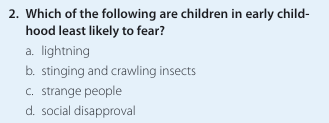
d
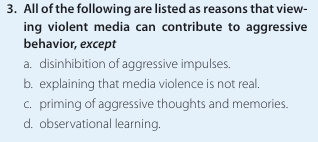
b
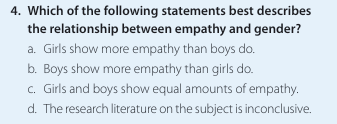
a
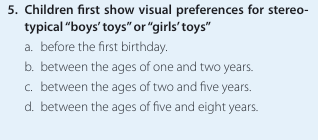
a

c
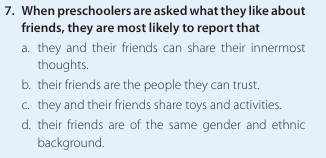
c

c
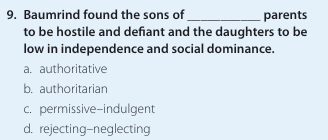
b

d